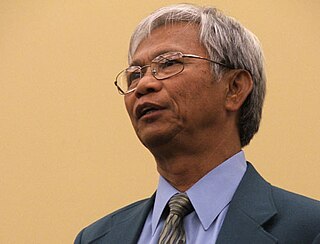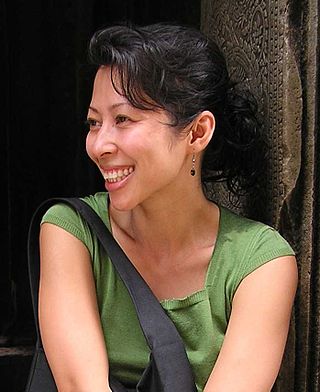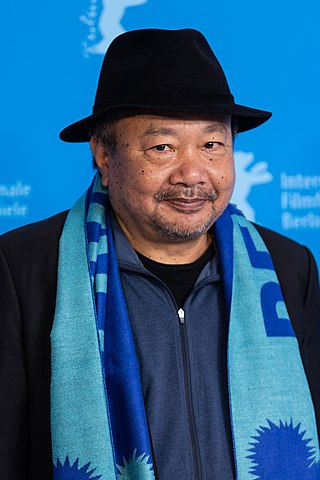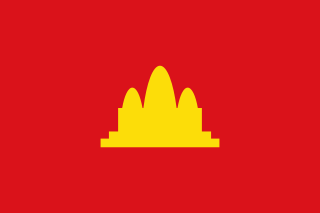Related Research Articles

Dith Pran was a Cambodian photojournalist. He was a refugee and survivor of the Cambodian genocide and the subject of the film The Killing Fields (1984).

Cambodia (; also Kampuchea, officially the Kingdom of Cambodia, is a country in the southern Indochinese Peninsula in Southeast Asia, spanning an area of 181,035 square kilometres, bordered by Thailand to the northwest, Laos to the north, Vietnam to the east, and the Gulf of Thailand to the southwest. The capital and largest city is Phnom Penh.

Kang Kek Iew, also spelled Kaing Guek Eav, aliasComrade Duch or Hang Pin, was a Cambodian convicted war criminal and leader in the Khmer Rouge movement, which ruled Democratic Kampuchea from 1975 to 1979. As the head of the government's internal security branch (Santebal), he oversaw the Tuol Sleng (S-21) prison camp where thousands were held for interrogation and torture, after which the vast majority of these prisoners were eventually executed.

Haing Somnang Ngor was a Cambodian American gynecologist, obstetrician, actor and author. He won the Academy Award for Best Supporting Actor in 1985 for his debut performance in the film The Killing Fields (1984), in which he portrayed Cambodian journalist and refugee Dith Pran.

Cambodian cuisine is an umbrella term for the cuisines of all ethnic groups in Cambodia, whereas Khmer cuisine refers specifically to the more than thousand years old culinary tradition of the Khmer people. Over centuries, Cambodian cuisine has incorporated elements of Indian, Chinese and more recently French cuisine, and due to some of these shared influences and mutual interaction, it has many similarities with the neighbouring Thai, Vietnamese and Lao cuisines.

Throughout Cambodia's long history, religion has been a major source of cultural inspiration. Cambodian culture and belief system from the syncreticism of indigenous animistic beliefs and the Indian religions of Buddhism and Hinduism. Indian culture and civilization, including its languages and arts reached mainland Southeast Asia around the 1st century AD.

The Killing Fields is a 1984 British biographical drama film about the Khmer Rouge regime in Cambodia, which is based on the experiences of two journalists: Cambodian Dith Pran and American Sydney Schanberg. It was directed by Roland Joffé and produced by David Puttnam for his company Goldcrest Films. Sam Waterston stars as Schanberg, Haing S. Ngor as Pran, Julian Sands as Jon Swain, and John Malkovich as Al Rockoff. The adaptation for the screen was written by Bruce Robinson; the musical score was written by Mike Oldfield and orchestrated by David Bedford.
The Khmer people are a Austroasiatic ethnic group native to Cambodia. They comprise over 90% of Cambodia's population of 17 million. They speak the Khmer language, which is part of the larger Austroasiatic-language family found in parts of Southeast Asia, parts of central, eastern, and northeastern India, parts of Bangladesh in South Asia, in parts of Southern China and numerous islands in the Indian Ocean.

Loung Ung is a Cambodian American human-rights activist, lecturer and national spokesperson for the Campaign for a Landmine-Free World, between 1997 and 2003. She has served in the same capacity for the International Campaign to Ban Landmines, which is affiliated with the Vietnam Veterans of America Foundation.

Rithy Panh is a Cambodian documentary film director and screenwriter.

Cinema in Cambodia began in the 1950s, and many films were being screened in theaters throughout the country by the 1960s, which are regarded as the "golden age". After a near-disappearance during the Khmer Rouge regime, competition from video and television has meant that the Cambodian film industry is a small one.

Kampuchea, officially known as Democratic Kampuchea from 5 January 1976, was a one-party totalitarian state which encompassed modern-day Cambodia and existed from 1975 to 1979. It was controlled by the Khmer Rouge (KR), the name popularly given to the followers of the Communist Party of Kampuchea (CPK), and was founded when KR forces defeated the Khmer Republic of Lon Nol in 1975.

Nong Samet Refugee Camp, in Nong Samet Village, Khok Sung District, Sa Kaeo Province, Thailand, was a refugee camp on the Thai-Cambodian border and served as a power base for the Khmer People's National Liberation Front (KPNLF) until its destruction by the Vietnamese military in late 1984.

Nong Chan Refugee Camp, in Nong Chan Village, Khok Sung District, Sa Kaeo Province, Thailand, was one of the earliest organized refugee camps on the Thai-Cambodian border, where thousands of Khmer refugees sought food and health care after fleeing the Cambodian-Vietnamese War. It was destroyed by the Vietnamese military in late 1984, after which its population was transferred to Site Two Refugee Camp.

Enemies of the People is a 2009 British-Cambodian documentary film written and directed by Rob Lemkin and Thet Sambath. The film depicts the 10-year quest of co-director Sambath to find truth and closure in the Killing Fields of Cambodia. The film features interviews of former Khmer Rouge officials from the most senior surviving leader to the men and women who slit throats during the regime of Democratic Kampuchea between 1975 and 1979.
Alive in the Killing Fields is the memoir of Nawuth Keat, a survivor of the Khmer Rouge genocide in Cambodia. The book was published in 2009 by National Geographic.

Kalyanee Mam is a filmmaker whose film, A River Changes Course, which she directed and produced, has won several awards, including the Grand Jury Award for World Cinema Documentary at the 2013 Sundance Film Festival and the Golden Gate Award for Best Documentary Feature at the 2013 San Francisco International Film Festival.
The Cambodian humanitarian crisis from 1969 to 1993 consisted of a series of related events which resulted in the death, displacement, or resettlement abroad of millions of Cambodians.

The Bophana Center is an audiovisual center located in Phnom Penh, Cambodia. The center is dedicated to restoring, protecting and enhancing the Cambodian audiovisual heritage.
Cambodian rock of the 1960s and 1970s was a thriving and prolific music scene based in Phnom Penh, Cambodia, in which musicians created a unique sound by combining traditional Cambodian music forms with rock and pop influences from records imported into the country from Latin America, Europe, and the United States. U.S. armed forces radio that had been broadcast to troops stationed nearby during the Vietnam War was also a primary influence. This music scene was abruptly crushed by the Khmer Rouge communists in 1975, and many of its musicians disappeared or were executed during the ensuing Cambodian genocide. Due to its unique sounds and the tragic fate of many of its performers, the Cambodian rock scene has attracted the interest of music historians and record collectors, and the genre gained new popularity upon the international release of numerous compilation albums starting in the late 1990s.
References
- ↑ Ker, Daron. "Daron Ker" . Retrieved 4 October 2011.
- ↑ Baxter, Kevin. "Filmmaker Daron Ker's story leads back to Cambodia". Los Angeles Times. Retrieved 4 October 2011.
- ↑ Piazza, Judyth. "Judyth Piazza interviews Cambodian Filmmaker Daron Ker on The American Perspective" . Retrieved 4 October 2011.
- ↑ Stylist, Sophi. "Daron Ker-Filmmaker and Director of Rice Field of Dreams". Archived from the original on 29 May 2011. Retrieved 4 October 2011.
- ↑ Pincus-Roth, Zach. "Hessians Motorcycle Club Biker Gang and Fryed Brothers Band Gather for Movie Premiere Last Night in West L.A." LA Weekly. Archived from the original on 13 October 2011. Retrieved 4 October 2011.
- ↑ Propes, Richard. "Daron Ker Interview". The Independent Critic. Archived from the original on 17 July 2012. Retrieved 4 October 2011.